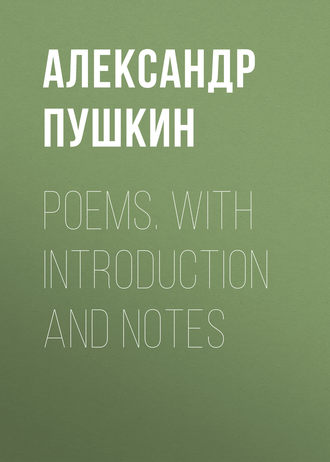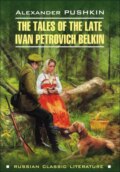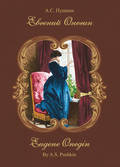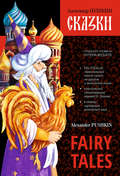
Александр Пушкин
Poems. With Introduction and Notes
… No sooner the heavenly word
His keen ear hath reached,
Then up trembles the singer's soul
Like an awakened eagle.
"The world's pastimes now weary him
And mortals' gossip now he shuns.
. . . . . . . . . .
Wild and stem rushes he
Of tumult full and sound
To the shores of desert wave
Into the wildly whispering wood."
9. This is as yet only discernment that the bard must needs suffer; by-and-by comes also the fulfilment, the recognition of the wisdom of the sorrow, and with it its joyful acceptance in the poem of "The Prophet."
"And out he tore my sinful tongue
. . . . . . . . . .
And ope he cut with sword my breast
And out he took my trembling heart
And a coal with gleaming blaze
Into the opened breast he shoved.
Like a corpse I lay in the desert.
And God's Voice unto me called:
Arise, O prophet, and listen, and guide.
Be thou filled with my will
And going over land and sea
Fire with the word the hearts of men!"
"Be thou filled with my will!" His ideal began with abandonment of self-will; it ended with complete surrender of self-will. When we have done all the thinking and planning and weighing, and pride ourselves upon our wisdom, we are not yet wise. One more step remains to be taken, without which we only may avoid the wrong; with which, however, we shall surely come upon the right. We must still say, Teach us, Thou, to merge our will in Thine....
II. INNER LIFE
10. I have already stated that Pushkin is a subjective writer. The great feelers must ever be thus, just as the great reasoners must ever be objective, just as the great lookers can only be objective. For the eye looks only on the outward thing; the reason looks only upon the outward effect, the consequence; but the heart looks not only upon the thing, but upon its reflection upon self,—upon its moral relation, in short. Hence the subjectivity of a Tolstoy, a Byron, a Rousseau, a Jean Paul, a Goethe, who does not become objective until he has ceased to be a feeler, and becomes the comprehender, the understander, the seer, the poised Goethe. Marcus Aurelius, Pascal, Amiel, look into their hearts and write; and Carlyle and Ruskin, even though the former use "Thou" instead of "I," travel they never so far, still find their old "I" smiling by their side. But the subjectivity of Pushkin, unlike that of Walt Whitman, is not only not intrusive, but it is even delight-giving,—for it paints not the Pushkin that is different from all other men, but the Pushkin that is in fellowship with all other men; he therefore, in reporting himself, voices the very experience of his fellows, who, though feeling it deeply, were yet unable to give it tongue. It is this which makes Pushkin the poet in its original sense,—the maker, the sayer, the namer. And herein is his greatness,—in expressing not what is his, in so far that it is different from what is other men's, but what is his, because it is other men's likewise. Herein he is what makes him a man of genius. For what does a genius do?
11. What is it that makes the water, when spouting forth in a smooth stream from the hose, such a power? What is it that makes the beauty of the stem and curve of the body of water, as it leaps out of the fountain? It is the same water which a few yards back we can see flowing aimless in stream or pond. Yes, but it is the concentration of the loose elements into harmonious shape, whether for utility, as in the case of the hose-spout, or for beauty, as in the case of the fountain. Nought new is added to the mass existing before. This is precisely the case of genius. He adds nought to what has gone before him. He merely arranges, formulates. A vast unorganized mass of intelligence, of aspiration, of feeling, becomes diffused over mankind. Soon it seeks organization. The poet, the prophet, the seer, cometh, and lo, he becomes the magnet round which all spiritual force of the time groups itself in visible shape, in formulated language.
12. Pushkin, then, is self-centred; but it is the self that is not Pushkin, but man. His mood is others' mood; and in singing of his life, he sings of the life of all men. The demon he sings of in the poem called "My Demon" is not so much his demon alone as also yours, mine, ours. It is his demon because it is all men's demon.
"A certain evil spirit then
Began in secret me to visit.
Grievous were our meetings,
His smile, and his wonderful glance,
His speeches, these so stinging,
Cold poison poured into my soul.
Providence with slander
Inexhaustible he tempted;
Of Beauty as a dream he spake
And inspiration he despised;
Nor love, nor freedom trusted he,
On life with scorn he looked—
And nought in all nature
To bless he ever wished."
And this demon—"the Spirit of Denial, the Spirit of Doubt"—of which he sings afterwards so pathetically tormented him long. He began with "Questionings:"—
"Useless gift, accidental gift,
Life, why art thou given me?
Or, why by fate mysterious
To torture art thou doomed?
"Who with hostile power me
Out has called from the nought?
Who my soul with passion thrilled,
Who my spirit with doubt has filled?…"
And he continues with "Sleeplessness:"—
"I cannot sleep, I have no light;
Darkness 'bout me, and sleep is slow;
The beat monotonous alone
Near me of the clock is heard
Of the Fates the womanish babble,
Of sleeping night the trembling,
Of life the mice-like running-about,—
Why disturbing me art thou?
What art thou, O tedious whisper?
The reproaches, or the murmur
Of the day by me misspent?
What from me wilt thou have?
Art thou calling or prophesying?
Thee I wish to understand,
Thy tongue obscure I study now."
13. And this demon gives him no rest, even long after he had found the answer,—that the meaning of Life is in Work. Solve the problem of life? Live, and you solve it; and to live means to do. But that work was the solution of the problem of life he indeed discerned but vaguely. It was with him not yet conscious fulfilment. He had not yet formulated to himself the gospel he unconsciously obeyed. Hence the wavering of the "Task:"—
"The longed-for moment here is. Ended is my long-yeared task.
Why then sadness strange me troubles secretly?
My task done, like needless hireling am I to stand,
My wage in hand, to other task a stranger?
Or my task regret I, of night companion silent mine,
Gold Aurora's friend, the friend of my sacred household gods?"
14. And for the same reason, when he had ceased to be a roamer and at last settled down to quiet home-life, the memory of the days of yore still gives him a pang; and at the sight of the gypsies, whose free and easy life once occupied his thoughts seriously, not only to sing of them, but to live with them, only a plaintive note bursts forth from his soul:—
"Thee I greet, O happy race!
I recognize thy blazes,
I myself at other times
These tents would have followed.
"With the early rays to-morrow
Shall disappear your freedom's trace,
Go you will—but not with you
Longer go shall the bard of you.
"He alas, the changing lodgings,
And the pranks of days of yore
Has forgot for rural comforts
And for the quiet of a home."
15. And this too when these same "rural comforts" he now regrets to have taken in exchange for his wanderings were the very circumstances he sighed for when he did lead the free life he now envies the gypsies for. For this is what he then had been singing:
"Mayhap not long am destined I
In exile peaceful to remain,
Of dear days of yore to sigh
And rustic muse in quiet
With spirit calm to pursue.
"But even far, in a foreign land
In thought forever roam I shall
Around Trimountain mine:
By meadows, river, by its hills,
By garden, linden, nigh the house."
16. No wonder, therefore, that the demon, having unsettled the poet's soul with restlessness, should now unsettle his reasoning powers with regrets. For regret is at bottom a disease, an inability to perceive that the best way to mend harm once done is not in lamenting the past, but in struggling for a future; in which future much of the past could be undone; or if it could not be undone, at least it could be prevented from contaminating with its corpse the life of the future. And his regret is bitter enough. In the first of the two poems, "Regret" and "Reminiscence," the feeling again is as yet only discernment; but in the second, the poison has already entered his soul, and accordingly it no longer is a song, but a cry of agony....
At first it is is only—
"But where are ye, O moments tender
Of young my hopes, of heartfelt peace?
The former heat and grace of inspiration?
Come again, O ye, of spring my years!"
But later it becomes—
"Before me memory in silence
Its lengthy roll unfolds,
And with disgust my life I reading
Tremble I and curse it.
Bitterly I moan, and bitterly my tears I shed
But wash away the lines of grief I cannot.
In laziness, in senseless feasts,
In the madness of ruinous license,
In thraldom, poverty, and homeless deserts
My wasted years there I behold...."
17. Regret, in itself a disease, but only of the intellect, soon changes into a more violent disease: into a disease of the constitution, which is fear, fear of insanity. In ordinary minds such disease takes the form of fear for the future, of worry for existence; in extraordinary minds it takes more ghastly shapes,—distrust of friends, and dread of the close embrace of what is already stretching forth its claws after the soul,—insanity.
Hence,—
"God grant I grow not insane:
No, better the stick and beggar's bag;
No, better toil and hunger bear.
. . . . . . . . . .
If crazy once,
A fright thou art like pestilence,
And locked up now shalt thou be.
"To a chain thee, fool, they 'll fasten
And through the gate, a circus beast,
Thee to nettle the people come.
"And at night not hear shall I
Clear the voice of nightingale
Nor the forest's hollow sound,
"But cries alone of companions mine
And the scolding guards of night
And a whizzing, of chains a ringing."
18. That thoughts of death should now be his companions is only to be expected. But here again his muse plainly sings itself out in both stages,—the stage of discernment and the stage of fulfilment. In the first of the two poems, "Elegy" and "Death-Thoughts" he only thinks of death; in the second he already longs for it.
In the first it is only—
"My wishes I have survived,
My ambition I have outgrown!
Left only is my smart,
The fruit of emptiness of heart.
"Under the storm of cruel Fate
Faded has my blooming crown!
Sad I live and lonely,
And wait: Is nigh my end?"
But in the second it already becomes—
"Whether I roam along the noisy streets
Whether I enter the peopled temple,
Whether I sit by thoughtless youth,
Haunt my thoughts me everywhere.
"I say, Swiftly go the years by:
However great our number now,
Must all descend the eternal vaults,—
Already struck has some one's hour.
. . . . . . . . . .
"Every year thus, every day
With death my thought I join
Of coming death the day
I seek among them to divine."
19. Pushkin died young; that he would have conquered his demon in time there is every reason to believe, though the fact that he had not yet conquered him at the age of thirty-eight must show the tremendous force of bad blood, and still worse circumstance, which combined made the demon of Pushkin. But already he shows signs of having seen the promised land.
In the three poems, "Resurrection," "The Birdlet" (iv. 133), and "Consolation," the first shows that he conquered his regret-disease; the second, that he already found in Love some consolation for sorrow. And the third shows that he already felt his way at least to some peace, even though it be not yet faith in the future, but only hope. For hope is not yet knowledge; it only trusts that the future will be good. Faith knows that the future must be good, because it is in the hands of God, the Good.
In the first it is—
"Thus my failings vanish too
From my wearied soul
And again within it visions rise
Of my early purer days."
In the second,—
"And now I too have consolation:
Wherefore murmur against my God
When at least to one living being
I could of freedom make a gift?"
And in the last,—
"In the future lives the heart:
Is the present sad indeed?
'T is but a moment, all will pass...."
This is consoling utterance, but not yet of the highest; and the loftiest spiritual song, the song of the Psalmist, was not given unto Pushkin to sing.
III. GENERAL CHARACTERISTICS
20. I have translated the poems of Pushkin not so much because they are masterpieces in the literature of Russia, as because I think the English reading-public has much to learn from him. English literature is already blessed with masterpieces, which, if readers would only be content to study them for the sake of what they have to impart (not amuse with!), would give enough employment as well as amusement for all the time an ordinary reader can give to literature. So that merely for the sake of making new beauty accessible to English readers, it is hardly worth while to go out of English literature, and drag over from beyond the Atlantic poor Pushkin as a new beast in a circus for admiration. The craze for novelty has its place in human nature but not as an end in itself. As a literary method, it might be found commendable in a magazine editor, whose highest ambition is to follow the standard of a public even he does not respect. It might be found commendable in a gifted author to whom bread is dearer than his genius, so that he is ready to sacrifice the one to the other; but an inexperienced author, who has not yet learned wisdom (or is it prudence merely?) from the bitter literary disappointments which are surely in store for every earnest, aspiring soul,—such an author, I say,—must not be expected to make mere novelty his motive for serious work. Nay, the conclusion at which Pascal arrived, at the age of twenty-six, that there is really only one book that to an earnest soul is sufficient for a lifetime to read,—namely, the Bible,—extravagant though this sound, I am ready, after many years of reflection on this saying of Pascal, to subscribe to, even at an age when I have six years of experience additional to his.... To read much, but not many books, is old wisdom, yet ever new. A literary masterpiece is to be read, not once, nor twice, nor thrice, but scores of times. A literary masterpiece should, like true love, grow dearer with intercourse. A literary masterpiece should be read and re-read until it has become part of our flesh and circulates in our blood, until its purity, its loftiness, its wisdom, utter itself in our every deed. It is this devotion to one book that has made the Puritans of such heroic mould; they fed on one book until they talked and walked and lived out their spiritual food. If any one think this estimate of the influence of one great book exaggerated, let him try to live for one week in succession wholly in the spirit of the one book that to him is the book (I will not quarrel with him if it be Smiles instead of St. Matthew, or Malthus's Essay on Population instead of the Gospel of St. John, or even our modern realistic Gospel of dirt), and let him see what will come of it.
21. Shakespeare, Milton, Carlyle, Ruskin, Emerson, Scott, Goldsmith, Irving, Johnson, Addison, furnish a library which is really enough for the life-time of any one who takes life seriously, and comes to these masters, not as a conceited lord waiting for amusement,—as a judge, in short,—but as a beggar, an humble learner, hoping to carry away from them not the tickle of pleasure, but the life-giving sustenance. To make letters a source of amusement is but to dig for iron with a spade of gold. Amusement is indeed often necessary, just as roasting eggs is often necessary; but who would travel to a volcano for the sake of roasting his eggs? No, the masters in letters are not sent to us for our amusement; they are sent to us to give the one answer to each of us, which at the peril of our lives we must sooner or later receive,—the answer to the question: How shall we live to be worthy of that spark from heaven which is given us in trust to keep alive for the brief years of life on earth? The great masters, then, are the inspirers; and God ever sees to it that there be enough inspirers, if men but see to it that there be enough inspired.
22. But of the millions of the English-speaking readers, who to-day assimilates the masterpieces of English literature? Generations come, and generations go. The classic writers keep their reputation; but do they hold their readers? Do the readers hold to the masters? Not the masters sway the public taste, not the writers of the first rank, not the giants; but the pygmies, the minions, the men of the second, fifth, twentieth rank. If any one think me extravagant, let him cast a glance of his open eyes at our monthly reviews and magazines, both here and in England, especially those whose circulation reaches into the hundreds of thousands....
23. Not, then, because additional masterpieces are needed for rousing our degenerate literary taste have I translated Pushkin. As long as the literary editors (who, from the very fact of once having the ear of the public, become the stewards of the hungry) insist on feeding it with the Roes and the Crawfords and the Haggards and the Stevensons and the rest of them, not only new masterpieces, but even the old ones will remain unread. The Bible lies on parlor table (if it ever get there!) unread; Milton lies indeed beautifully bound, but has to be dusted once a week; and Emerson need not even be dusted,—he has not yet got as far as to be the ornament of parlor table.
But I have translated Pushkin because I believe that even the masters of English literature have defects which are part of the English character; and as such they must reappear in its literature. And it is against these that Pushkin's poems offer a healthy remedy.
24. For the first characteristic of the Anglo-Saxon race is that it is a race of talkers; and the destinies of the two most advanced nations of that race are to-day governed almost wholly by men whose strength is neither in the head nor in the will nor in the heart, but in the tongue. But the talker cares only for the effect of the moment. With the great hereafter he has but little to do; hence he becomes, first of all, a resounder, a thunderer, a sky-rockety dazzler. And once that, the orator need not even care whether he persuade or not; if he merely astound the ear, dazzle the eye, and overwhelm the hearer himself for the moment,—if, in short, he but produce an effect, even if it be not the effect desired,—it is well with him in his own estimation. The orator thus soon becomes the mere rhetorician. And this rhetorical quality, appealing as it does only to the superficial in man, and coming as it does only from the surface of the man, is found nowhere in such excess as in the poetry of the Anglo-Saxon race. Ornament, metaphor, must be had, and if it cannot be had spontaneously from a fervid imagination, which alone is the legitimate producer of metaphor, recourse must be had to manufactured sound. Hence there is scarcely a single poet in the English tongue whose style is not vitiated by false metaphor; this is true of the greatest as well as of the least. The member of Parliament who smelt a rat, and saw it brewing in the air until it was in danger of becoming an apple of discord to the honorable members of the House, could have been born only on British soil. To take up arms against a sea of trouble, and to discover footprints in the sands of time while sailing over life's solemn main (no less than five false metaphors in this example from the Psalm of Life!) are feats that can be accomplished by the imagination of even a Shakespeare or a Longfellow solely because these are Anglo-Saxons. And I am yet to see five consecutive pages of any Anglo-Saxon poet free from this literary vice of false metaphor! I call this a vice because it is at bottom an insincerity of imagination. The false metaphors are not pictures seen, but pictures made up; they are not the spontaneous outbursts of an overflowing imagination, but the ground-out product of pictureless will for the sake of effect. And this I do not hesitate to call literary insincerity even though the process of making them up be unconscious at the time to the poet himself.
25. Now it is Pushkin's great virtue that his imagination is eminently spontaneous. He seldom uses adjectives; but when he does use them, he uses such only as do actually describe something. He seldom uses similes or metaphors,—he prefers to sing of the subjects themselves, not of what they resemble; but when he does use them, the reader's imagination is able to see the picture the poet had in mind, which is not often true of the English bards. Examples for comparison are innumerable; let a few suffice. Turn to Pushkin's lines, "Regret." He there regrets the days of his youth, but first tells by way of contrast what he does not regret; and his poem is simple, straightforward. Byron, however, in his "Stanzas for Music," of which Canon Farrar thought well enough to insert them in his "With the Poets," and Mr. Palgrave thinks good enough to be admitted into his "Treasury of English Poetry," finds it necessary to preface it with something like philosophical remarks, and then proceeds in this fashion:—







